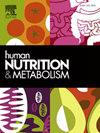Proteins from insects: A sustainable alternative for oral health within the one health concept and the planetary health diet
IF 1.8
Q3 ENDOCRINOLOGY & METABOLISM
引用次数: 0
Abstract
The growing use of insect-derived proteins as a food source, driven by their nutritional benefits and low environmental impact, raises questions about their impact on human health, particularly oral health. This position paper analyzes the potential implications of integrating insect proteins into the diet, with a special focus on dental, periodontal, and oral microbiome health. By offering complete amino acid profiles, omega-3 fatty acids, and antimicrobial peptides, insect proteins may help address nutritional gaps and positively influence oral tissue regeneration and microbiome balance. Their low-carbohydrate content also reduces substrate availability for cariogenic bacteria, making them a valuable alternative to starch- or sugar-rich diets. We justify this dietary transition in light of present nutritional deficiencies and demonstrate how insect proteins can register within a holistic approach to global health (One Health) and the Planetary Health Diet, supporting sustainability and improving overall health. However, further studies are needed to evaluate their safety as potential sources of allergens and contaminants. Both in-vitro and in-vivo studies are needed to assess correlations with the oral microbiota and its most frequent dysbiosis-related manifestations.
来自昆虫的蛋白质:在一个健康概念和全球健康饮食中可持续的口腔健康替代品
由于其营养价值和低环境影响,越来越多地使用昆虫来源的蛋白质作为食物来源,这引发了对其对人类健康,特别是口腔健康影响的问题。本文分析了将昆虫蛋白整合到饮食中的潜在影响,特别关注牙齿、牙周和口腔微生物群健康。通过提供完整的氨基酸谱、omega-3脂肪酸和抗菌肽,昆虫蛋白可以帮助解决营养缺口,并对口腔组织再生和微生物群平衡产生积极影响。它们的低碳水化合物含量也减少了致龋细菌的底物可用性,使它们成为淀粉或富含糖的饮食的有价值的替代品。鉴于目前的营养缺乏,我们证明了这种饮食转变是合理的,并展示了昆虫蛋白如何在全球健康(一个健康)和行星健康饮食的整体方法中发挥作用,支持可持续性并改善整体健康。然而,需要进一步的研究来评估它们作为过敏原和污染物的潜在来源的安全性。需要体外和体内研究来评估与口腔微生物群及其最常见的生态失调相关表现的相关性。
本文章由计算机程序翻译,如有差异,请以英文原文为准。
求助全文
约1分钟内获得全文
求助全文
来源期刊

Human Nutrition and Metabolism
Agricultural and Biological Sciences-Food Science
CiteScore
1.50
自引率
0.00%
发文量
30
审稿时长
188 days
 求助内容:
求助内容: 应助结果提醒方式:
应助结果提醒方式:


